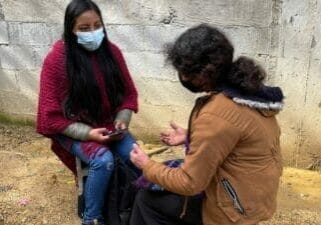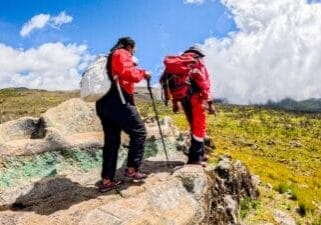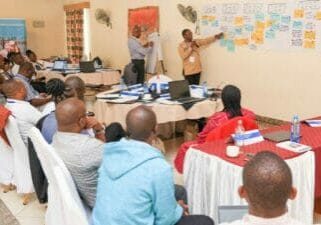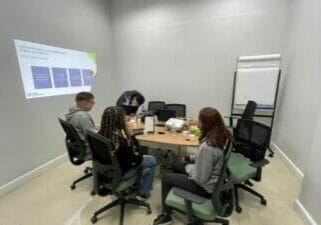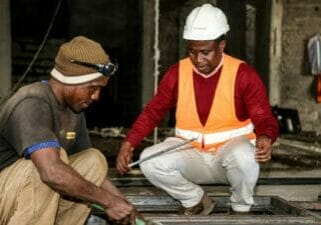News > Blog
Pass the Mic: Growing from Our Roots: Exploring the History and Future of Cooperative Development Programming at Global Communities
Published 11/01/2023 by Global Communities

By Paula Rudnicka, Sr. Manager for Public Affairs at Global Communities
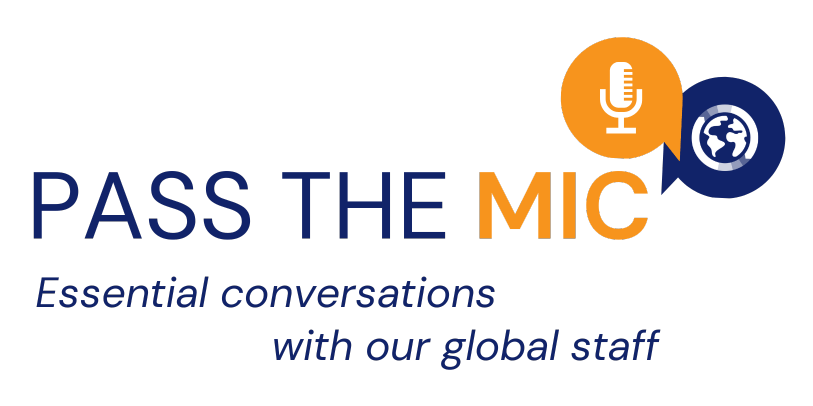
Global Communities’ history is deeply rooted in the cooperative movement. Our organization was created in 1952 as the Foundation for Cooperative Housing, and for over 30 years we used the cooperative model to help build 60,000 houses for people in need across 35 states in the United States. In 1962, our programming expanded to Central America, demonstrating that the successful cooperative housing model could be replicated in other countries. In the 1990s, following the fall of the Berlin wall, we began working in Eastern Europe, still heavily focusing on cooperative housing. In Poland, for example, we created a training program to help cooperatives establish themselves in the newly forming post-socialist market economy. By the close of the program, an estimated 4,560 Polish citizens found new homes in more than 1,000 new cooperative housing units across the country. While our name has changed to Global Communities and our work has expanded beyond cooperative development, our commitment to partnering with cooperatives to bring about sustainable, positive change remains the same.
Our current Cooperative Leadership, Engagement, Advocacy and Research (CLEAR) program, implemented since 2018 and funded by the United States Agency for International Development (USAID), has strengthened the cooperative ecosystem in Kenya. CLEAR has supported counties in developing cooperative policies, coached cooperatives to enhance their business performance, and created research and learning products to support cooperative development globally. CLEAR has also introduced the worker cooperative model to Kenya and successfully supported the 10 first ever worker cooperatives through registration and start-up.
While CLEAR is set to close in December 2023, we are thrilled to announce CLEAR+, the next phase of our cooperative development programming. CLEAR+ will strengthen the cooperative sectors in Guatemala and Kenya through improved legal frameworks, advocacy and learning.
I recently sat down with Ashley Holst, CLEAR+ Chief of Party at Global Communities, to chat about lessons learned from our rich cooperative history and how we are planning to apply them in CLEAR+. The interview was edited for length and clarity.
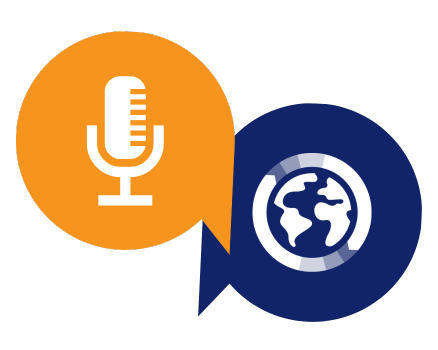
Paula: Congratulations on securing CLEAR+! Amazing news. Before we dive into the future of cooperative development programming at Global Communities, let’s talk about what we have learned from the first phase of CLEAR. How would you define the success of the program?
![]()
Ashley: We learned a lot during the first phase of CLEAR. It has been a very successful program, but achieving the key milestones took a lot of effort. One of the main reasons for that is that we chose to focus on advocacy and education around a relatively new and innovative form of cooperatives called worker cooperatives. We wanted to see how we could use the cooperative model to create more jobs and economic opportunities for folks living in urban areas and working in the up-and-coming service and tech industries. We found that it takes quite some time to build awareness around worker cooperatives. But, once we had the ball rolling and the worker cooperatives started to form, we saw a lot of success and interest in these cooperatives. One of the objectives of the program was centered around policy reform, so we also learned that policy advocacy takes a long time. It requires a lot of community engagement, information sharing, and trust building to shape policies that have local buy-in and are successful in the long run.
Paula: Cooperative businesses play a vital role in advancing sustainable development goals by promoting inclusive economic growth, alleviating poverty and reducing inequality. How has CLEAR contributed to advancing the global development agenda?
![]()
Ashley: One of the most important and exciting aspects of cooperative development is that cooperatives help individuals achieve greater economic security. In addition, cooperatives are inherently inclusive. Any person who meets the criteria of a particular cooperative can join it, which can be life-changing for traditionally excluded or overlooked populations, including women and youth. CLEAR has been very intentional about promoting economic development for women and youth not only by encouraging them to join or form cooperatives, but also to become leaders. In fact, many cooperatives supported by CLEAR in Kenya are led by young entrepreneurs who came together to form worker cooperatives. We designed CLEAR+ to specifically focus on young professionals in the gig economy in such sectors as transportation, tourism and the service industry, like mechanics and construction. The worker cooperative model is a perfect way for youth to have ownership and decision-making in their businesses, while being able to share the risks and resources in the operation of these businesses.
Paula: Cooperatives are also powerful partners in strengthening resilient communities. Could you shed some light on how CLEAR has supported Kenyan cooperatives in building social capital and social cohesion?
![]()
Ashley: Cooperatives support their members and communities with both economic and social capital. Global Communities co-authored a research study with the U.S. Overseas Cooperative Development Council to look at this issue in four countries around the world. We found that cooperative members not only had stronger economic outcomes, but also stronger safety nets that helped them in times of crisis. We also conducted a five-year longitudinal study that looked at how people rely on their cooperatives when they experience shocks, such the Covid-19 pandemic, a flood, or a drought. We found that people really count on their cooperatives to overcome shocks and stresses. We also saw that cooperatives were more resilient during the pandemic than other businesses. They were more likely to stay in business and support their members and communities around them. We know that cooperatives are a way for folks who generally work more independently, like agricultural producers or motorcycle taxi drivers, to share business risks and rewards with their fellow cooperative members. This increases their ability to withstand challenges and become stronger in the long run.

Paula: What is the most important lesson learned from the first phase of CLEAR? How are you planning to apply it within CLEAR+?
![]()
Ashley: I cannot overemphasize the importance of education and awareness among cooperative stakeholders about the worker cooperative model and its potential to effect meaningful change. For CLEAR, this took quite a bit of time and we had to redesign some of our activities to include training and advocacy around the worker cooperative model. To this end, we partnered with the Democracy at Work Institute – a reputable training institution in the United States – to design training materials around this model. We use these materials not only with nascent worker cooperatives, but also with cooperative developers, local government institutions, and some of our fellow cooperative development organizations, both Kenyan and international. This focus on advocacy and education was really critical for the program and its long-term impact. I would add that establishing strong, trusting relationships with government stakeholders in Kenya was also vital for the success of our policy and enabling environment activities.
Paula: CLEAR+ will focus on supporting worker cooperatives in Kenya and Guatemala. What are the top three things that the public should know about the worker cooperative model?
![]()
Ashley: The most exciting aspect of the worker cooperative model is its applicability to many different sectors and industries. We know that globally people are moving towards urban centers. We also know that young people are less and less interested in agriculture. As the population of youth is growing in many countries, we need to think creatively about how to ensure that young people have access to good jobs with high earning potential. From my point of view, the worker cooperative model opens a lot of doors for young professionals in sectors that traditionally attract independent entrepreneurs, for example motorcycle taxi drivers or auto mechanics. Worker cooperatives allow young people to come together, learn from each other, and benefit from common resources, such as shared workspaces or marketing and financial management services. It is simply much cheaper to co-own or co-rent a workshop or a garage than manage it yourself.
Another great thing about this model is that worker cooperatives can be much smaller than traditional agricultural cooperatives, many of which have hundreds or even thousands of members. A worker cooperative can be as small as 2 or 3 members, dependent on the laws of a particular country. This creates a lot of opportunities for smaller cooperatives that are more niche.
Paula: Worker cooperatives are less known and typically less valued than other types of cooperatives. Why? What are some of the key cultural misconceptions about this model?
![]()
Ashley: The biggest misconception is that cooperatives are agricultural in nature. Many people don’t know that the cooperative model can be applied to other sectors too. When they think of cooperatives, they think of corn and dairy, and of individual farmers who are dropping their goods off at a cooperative and getting paid. The worker cooperative model can be confusing, because the employees are also the members. Instead of having a product to sell to a cooperative, they are contributing their time, labor and expertise. Another misconception about the worker cooperative model is that members are always looking for the next opportunity, for the next best thing. But in a worker cooperative, the workers are, in fact, the co-owners. They are proud of their company, and they want it to succeed. So, if structured in a solid way, a worker cooperative can provide long-term livelihood solutions for its members.

Paula: CLEAR+ will be implemented in Kenya and Guatemala – two very different contexts legally, culturally and linguistically. How will the program address these differences?
![]()
Ashley: We have a fantastic opportunity to take the lessons learned in Kenya and apply them in Guatemala, which is CLEAR’s new implementation country. We’ve learned a lot about how to build awareness and create buy-in around the worker cooperative model, which we will definitely employ in Guatemala. We will also continue to work with the Democracy at Work Institute, which is excited to translate and adapt their materials to the Guatemalan context. One of the reasons we picked Guatemala is because it is ripe for opportunity in the service sector. The country has a booming tourism economy, where we think the worker cooperative model will make great impact. Guatemala also has a very large artisanal community working on weaving and beading and even creating artisanal food products like coffee and honey. I am certain that Guatemalan artisans will thrive in worker cooperatives, benefiting from the security and shared resources these cooperatives offer.
Another lesson that we will apply in Guatemala is using a market systems approach and working more closely with local business service providers. Rather than directly coaching worker cooperatives, we will invest in Guatemalan entities to train and mentor them. It is my hope that this relationship will continue long past CLEAR+, leading to greater sustainability of our program.
Paula: CLEAR+ will also seek to improve the enabling environment for worker cooperatives through legal and policy reform. What are some of the most common regulatory challenges that hinder the ability of worker cooperatives to thrive?
![]()
Ashley: The enabling environment framework is very important in the cooperative development sector. Unless cooperatives operate in a legal and sociopolitical system that allows them to thrive as businesses, they cannot achieve their full potential. When cooperatives are not treated in the same way as other businesses from a legal perspective, their earning capacity is impaired, and they are less profitable. For example, taxation is often a problem. Some legal systems do not have a clear definition of a cooperative as a business enterprise, which creates confusion about how cooperatives should be taxed. When regulatory gaps like this exist, cooperatives may get double-taxed or taxed at a higher rate. We always look at this issue when reviewing an enabling environment for worker cooperatives in new contexts.
Another issue is the number of members required for registration. Policies are often created around agricultural cooperatives, which are the most common in most countries. If a policy is written with agricultural cooperatives in mind, it may require 50 members to register a worker or housing cooperative. This requirement can be next to impossible for nonagricultural cooperatives to meet. We are advocating for revisions to this requirement both in Kenya and Guatemala to allow much smaller cooperatives to register and operate successfully.
Paula: How will CLEAR+ promote gender equality and positive youth development in two very different cultural contexts?
![]()
Ashley: Cooperatives typically have diverse membership and inclusive policies. In many countries, however, there are usually more men than women within those cooperatives. It’s also very challenging for women to secure leadership positions on cooperative boards and management teams. To address this issue, CLEAR+ is working with cooperatives in Guatemala and Kenya to help them create systems and structures that not only encourage women and youth to become active members, but also to take on leadership roles. Sometimes this requires very simple solutions, like ensuring that meeting times are convenient for women and young people or setting goals for cooperatives to have certain numbers of women or youth on their boards. One of the main ways we hope to be more inclusive within CLEAR+ is to support sectors which attract women and youth, such as the tourism and artisanal sectors. We know that many women are already working in these sectors as independent entrepreneurs. We also know they could really benefit from the formation of cooperatives.
Paula: Looking into the future, what innovations or advancements do you foresee in the field of cooperatives? How might Global Communities capitalize on them?
![]()
Ashley: We are seeing a lot of interest among cooperatives to incorporate more technology into their operations and marketing efforts. Many cooperatives we have supported in Kenya have had a lot of success with social media marketing and the use of simple technologies, like mass text messaging, to communicate with their members and current or potential customers. This has made a really big difference. We had one cooperative that offered a training on solar engineering. Because of the social media marketing they did, they maxed out the number of registrations, which had never happened to them before. Young people and worker cooperatives are really hungry for these technological advancements. Also, I would argue that the worker cooperative model is innovative itself because it can be applied to unique and diverse sectors. Within CLEAR, we have one cooperative that works in the acting and drama space. Utilizing the worker cooperative model with them has been very exciting.
One of the innovative aspects of the CLEAR program was our focus on accessible ways to disseminate information and training. We created a series of 30 short training videos that would accompany in-depth training that cooperative leaders were receiving through the program. Cooperatives have access to those videos on our YouTube page. They can go back to them at any time as either a refresher or to train a new board member. The videos cover such issues as financial management, governance, communication with members and gender inclusivity.
Paula: How are CLEAR and CLEAR+ planning for the longevity of the worker cooperative model?
![]()
Ashley: As we all know, USAID and the development sector in general are very interested in sustainability and localization. In CLEAR+, we apply these principles by utilizing a market systems approach to supporting worker cooperatives through their inception, start up and registration. In Kenya, we engaged several professional business service providers which helped the cooperatives design business and financial plans. We found this to be a very strong approach, but it takes time and effort to create these types of relationships. In CLEAR+ we decided to employ a market systems approach and create an environment where cooperatives are interested and willing to engage professional service providers trained on the cooperative model. We’re very hopeful that connecting service providers and cooperatives will create more opportunities for them to work together in the future. At the beginning, the program will provide scholarships to cooperatives to purchase these services. We trust that gradually our cooperatives will be able to afford these services themselves. We will also create a working group of service providers so that the CLEAR+ program can provide capacity strengthening and mentorship to them throughout the life of the program. When CLEAR+ wraps up in five years, we will have a very strong network of service providers which are working with cooperatives and can continue to scale up the worker cooperative model in both Kenya and Guatemala.
Paula: Thank you for your time! How can our readers learn more about your work?
![]()
Ashley: To learn more about cooperative development, please visit our website and read a recent story, Collaborating for Impact in Kenya’s Cooperative Sector. I also encourage you to watch our recent webinar, Beyond Inclusive Economic Growth: Harnessing the Power of Cooperatives and Savings Groups to Strengthen Resilient Communities. If you have questions about our programs, please email us at [email protected]. You can also find me on LinkedIn.
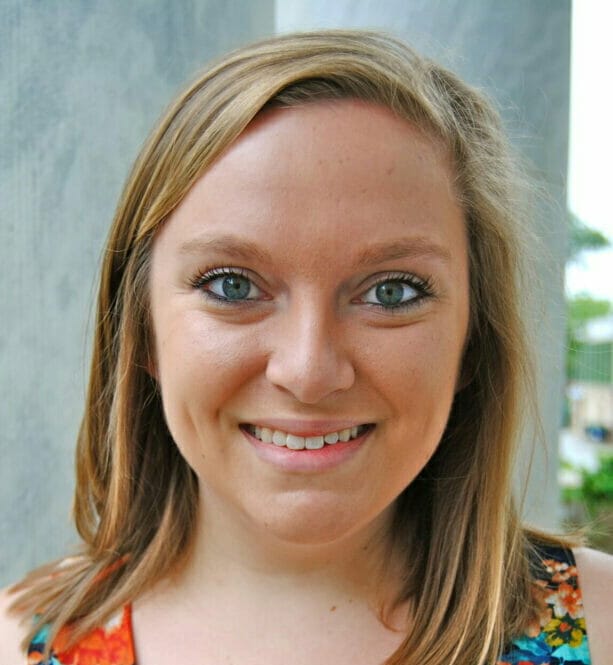
Ashley Holst
Ashley Holst is a Senior Technical Specialist of Cooperatives and Inclusive Businesses at Global Communities and supports the Cooperative Leadership, Engagement, Advocacy and Research (CLEAR) program in Kenya, along with supporting the overall cooperative technical area. She earned a master’s degree in International Development, specializing in Monitoring & Evaluation from American University in Washington, D.C., and an undergraduate degree in Sociology and International Political Science from Drury University in Springfield, Missouri.
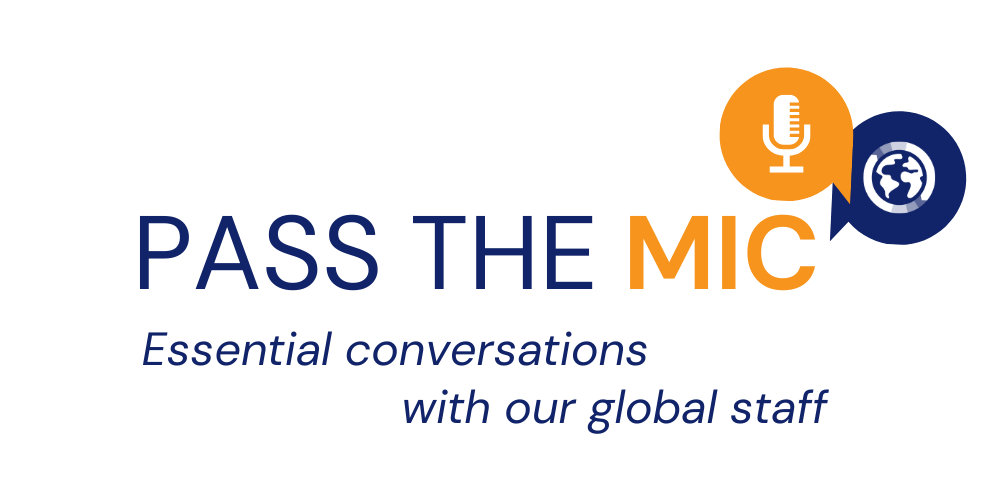
Global Communities is home to a diverse team of professionals with a broad range of expertise and perspectives that help us build the world we envision: one of expanded opportunity, where crises give way to resilience and all people thrive. In our new “Pass the Mic” series, our global staff share innovative ideas and in-depth insights on timely topics spanning the development, humanitarian and peace nexus. Learn how our colleagues are co-creating a more just, prosperous and equitable global community.


